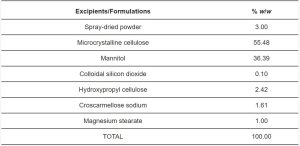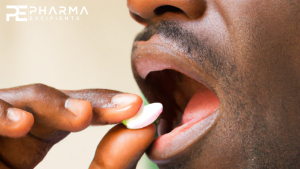Eudragit® FS Microparticles Containing Bacteriophages, Prepared by Spray-Drying for Oral Administration

Phage therapy is recognized to be a promising alternative to fight antibiotic-resistant infections. In the quest for oral dosage forms containing bacteriophages, the utilization of colonic-release Eudragit® derivatives has shown potential in shielding bacteriophages from the challenges encountered within the gastrointestinal tract, such as fluctuating pH levels and the presence of digestive enzymes. Consequently, this study aimed to develop targeted oral delivery systems for bacteriophages, specifically focusing on colon delivery and employing Eudragit® FS30D as the excipient.
The bacteriophage model used was LUZ19. An optimized formulation was established to not only preserve the activity of LUZ19 during the manufacturing process but also ensure its protection from highly acidic conditions. Flowability assessments were conducted for both capsule filling and tableting processes. Furthermore, the viability of the bacteriophages remained unaffected by the tableting process.

Additionally, the release of LUZ19 from the developed system was evaluated using the Simulator of the Human Intestinal Microbial Ecosystem (SHIME®) model. Finally, stability studies demonstrated that the powder remained stable for at least 6 months when stored at +5 °C.
Download the full article as PDF here Eudragit® FS Microparticles Containing Bacteriophages, Prepared by Spray-Drying for Oral Administration
or read it here
Materials
The bacteriophage named LUZ19, which is a P. aeruginosa bacteriophage classified as a podovirus, with propagation strain PAO1K was used as a model bacteriophage (2.0 × 1011 pfu/mL). Professor Rob Lavigne of KU Leuven, Belgium provided the LUZ19 bacteriophage while the Queen Astrid Military Hospital in Brussels, Belgium supplied the propagation strain PAO1K. A prior study provided a comprehensive description of bacteriophage LUZ19 [40]. D-(+)-trehalose dihydrate and L-isoleucine of non-animal origin were purchased from Sigma-Aldrich (Overijse, Brussels). Eudragit® FS 30D, an aqueous dispersion of anionic copolymer based on methyl ACRYLate, methyl methACRYLate, methACRYLic acid, as well as PlasACRYL® T20, and Aerosil® 200 VV Pharma, were purchased from Evonik (Darmstadt, Germany). PlasACRYL® T20 is a 20% emulsion made of sliding agent and plasticizer. It is composed of water, glycerol monostearate, triethyl citrate, and polysorbate 80 and is designed to be used exclusively with the Eudragit® FS30D. Spray-dried mannitol (Pearlitol® 100), used as diluent, microcrystalline cellulose (MCC 102), binder and croscarmellose sodium (Solutab A), and superdisintegrant, were generously offered by Roquette (Lestrem, France). Medium viscosity hydroxypropyl cellulose (HPC, Nisso HPC-M, Nippon Soda, Tokyo, Japan) was also used. Ultrapure (ELGA) water (>18.2 MΩ) was used as dispersant. The capsules used were Capsugel® Vcaps® Plus, sizes 00, 0, and 1 (Lonza, Verviers, Belgium). Magnesium stearate.
Tabare, E.; Dauchot, T.; Cochez, C.; Glonti, T.; Antoine, C.; Laforêt, F.; Pirnay, J.-P.; Delcenserie, V.; Thiry, D.; Goole, J. Eudragit® FS Microparticles Containing Bacteriophages, Prepared by Spray-Drying for Oral Administration. Pharmaceutics 2023, 15, 1602. https://doi.org/10.3390/pharmaceutics15061602
Read more on Orally Disintegrating Tablets (ODTs) here:


